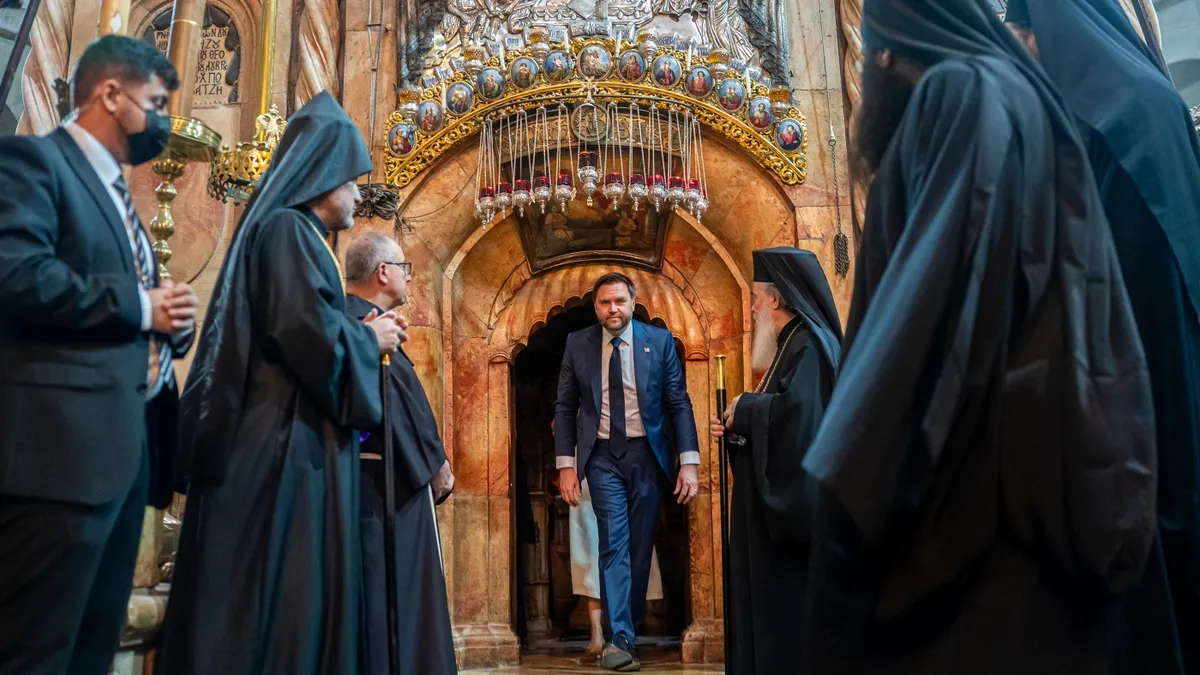
JERUSALEM — U.S. Vice President JD Vance delivered a sharp critique on Thursday regarding the recent vote by Israel's parliament to pursue West Bank annexation, labeling it an insult. Vance's comments came at the conclusion of his visit to Israel, coinciding with U.S. Secretary of State Marco Rubio announcing plans to travel to the region. The statements by Vance and the ongoing diplomatic efforts signal that the administration of U.S. President Donald Trump remains committed to maintaining the momentum of the U.S.-brokered ceasefire between Israel and Hamas in Gaza.
As he prepared to depart from Tel Aviv's international airport, Vance expressed his views on the Knesset's vote, stating, "If the Knesset vote was a political stunt, then it is a very stupid political stunt." He emphasized that he personally found the vote insulting and reiterated the Trump administration's stance that the West Bank will not be annexed by Israel.
Earlier this week, Vice President Vance announced the establishment of a civilian military coordination center in southern Israel, where approximately 200 U.S. troops are collaborating with the Israeli military and delegations from other nations to plan for the stabilization and reconstruction of Gaza. During a press briefing at Joint Base Andrews on Wednesday, Secretary Rubio disclosed his intention to visit this center and appoint a Foreign Service official to coordinate with the U.S. military command in the Middle East, led by Vice Adm. Brad Cooper.
The U.S. is actively seeking support from allies, particularly Gulf Arab nations, to form an international stabilization force that would be deployed to Gaza and assist in training a non-Hamas Palestinian police force. Rubio stated, "We'd like to see Palestinian police forces in Gaza that are not Hamas and that are going to do a good job, but those still have to be trained and equipped." He also condemned the actions of far-right politicians in the Israeli parliament, who recently advanced a bill that would grant Israel the authority to annex the occupied West Bank, a move the U.S. opposes.
Rubio remarked, "Trump has made clear that's not something we'd be supportive of right now, and we think it's potentially threatening to the peace deal." The controversial bill passed with a narrow 25-24 vote, although its future remains uncertain as it may lack the majority support needed in the 120-seat parliament. Prime Minister Benjamin Netanyahu possesses the tools to delay or defeat the bill.
During his visit, Vance also toured the Church of the Holy Sepulcher, a historic 12th-century basilica in Jerusalem's Old City that holds significant religious importance for Christians, as it is believed to be the site of Jesus' crucifixion, death, and resurrection. Following this, he is scheduled to meet with Israel's Defense Minister, military leaders, and other key officials at the army's headquarters in Tel Aviv.
On Wednesday, Vance sought to alleviate concerns that the Trump administration was imposing its will on Israel, stating, "We don't want in Israel a vassal state, and that's not what Israel is. We want a partnership, we want an ally." His comments were made alongside Prime Minister Netanyahu, who echoed similar sentiments while acknowledging existing differences as they work towards the U.S.-proposed ceasefire agreement.
Israeli media have humorously referred to the frequent visits by American officials to ensure Israel adheres to the fragile ceasefire as "Bibi-sitting," a nod to Netanyahu's nickname and an allusion to his political campaign history.
The humanitarian situation in Gaza remains dire, with the head of the World Health Organization announcing the first medical evacuation since the ceasefire began on October 10. Tedros Adhanom Ghebreyesus reported the evacuation of 41 critical patients along with 145 companions from the Gaza Strip. He urged nations globally to show solidarity and assist the approximately 15,000 patients still awaiting approval for medical treatment outside Gaza.
Andrew Saberton, an executive director at the UN Population Fund, shared a harrowing account of the conditions in Gaza, stating, "There is no such thing as a normal birth in Gaza now." He explained that the lack of functioning healthcare facilities has severely hampered the agency's efforts to provide assistance. "I was not fully prepared for what I saw. One can't be. The sheer extent of the devastation looked like the set of a dystopian film," he added.
Saberton detailed the struggles faced by Palestinian women, who often lack access to hospitals and even private spaces to give birth, with reports of women delivering babies in rubble or alongside roads.
In a separate development on Thursday, Israel's Supreme Court convened to discuss the possibility of granting international media access to the Gaza Strip, giving the government 30 days to provide a new position amid the ongoing ceasefire. Since the outbreak of conflict on October 7, 2023, Israel has restricted reporters from entering Gaza, prompting the Foreign Press Association to petition the court for access.
Following the court's decision, the FPA expressed disappointment, deeming the government's stance on restricting media access unacceptable. Earlier in the conflict, the court had denied a similar request from the FPA, citing security concerns raised by the government. The FPA has filed a second request for access, but the government has repeatedly postponed hearings on the matter.
Palestinian journalists, who have bravely reported on the two-year conflict, face significant constraints on movement and resources. Tragically, approximately 200 Palestinian journalists have lost their lives due to Israeli fire, according to the Committee to Protect Journalists. Tania Kraemer, chairperson of the FPA, urged, "It is time for Israel to lift the closure and let us do our work alongside our Palestinian colleagues."